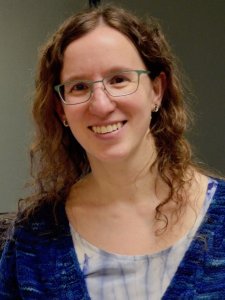What is your area of expertise and what is your research focus?
Atmospheric, Physical, and Analytical Chemistry
My research is focused on characterizing aerosol particles. I am interested in the effect of the small size of aerosol particles on how they behave in the atmosphere as well as processes that happen at the surfaces of aerosol particles.
How did you end up in STEM?
As a child, I was very interested in both math and craft projects. I really started to enjoy science in middle school because I liked doing experiments and learning about how the world works. In both middle school and high school, I really gravitated towards math and science, though my interests were very broad. In particular, I had an amazing advanced chemistry class as a high school student. The emphasis in the class was on running laboratory experiments. If we finished early, we could run our own experiments, as long as the teacher okayed them. This chance to run my own experiments in lab was among my favorite memories of high school.
What hurdles or challenges (big or small) did you find as you pursued your career in STEM? What challenges do you face today?
Shyness and imposter syndrome have always affected me and continue to today. I have not always sought out advice when I’ve needed it or made as many connections as I would like. I am slowly becoming better at this with time. Imposter syndrome can be both good and bad – I think it can be a motivating force to work harder, but it can also be discouraging. Having a name for these thoughts is helpful in overcoming them.
What or who was an inspiration or support for you?
My parents were both big inspirations and support for me. My father really encouraged my interest in math and crafts, and later, in research, as his own career shifted to have more of a research focus over time. My mother was inspiring in the fact that she pursued a career in medicine when few women did. She was one of 10 women in a medical school class of 150, and she faced a lot of discrimination in obtaining her degree and starting out in the medical field. She emphasized the need for always developing a support network.
Why is it important for women to be in STEM and specifically your field?
We need all perspectives to advance science to its fullest and build scientifically literate/accepting communities. I am fortunate to be in a field that is probably 1/3 women already, and I believe that women bring different perspectives/interests into the field.
What can be done to recruit more women into STEM?
Having female role models is very important. I have been fortunate to have research advisors as an undergraduate and graduate student who were very supportive of women in science, but it took having a female postdoctoral advisor for me to see myself pursuing a research-focused career rather than a teaching-focused one.
What advice would you give to girls and young women going into STEM?
Many interests can lead to a career in STEM. For example, not all chemists grow up making minor explosions in their houses from playing with chemicals. Science needs people with all interests and backgrounds. We also need people who get science degrees and go into fields outside of science like writing, law, and policy.

